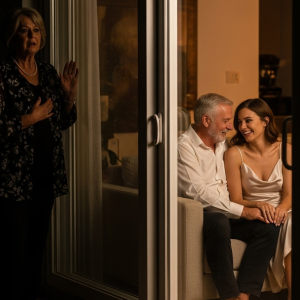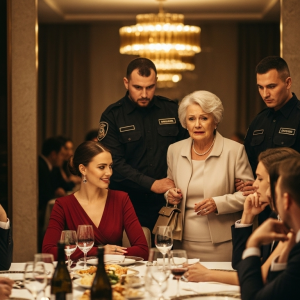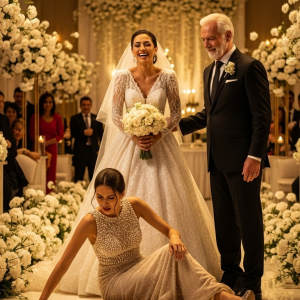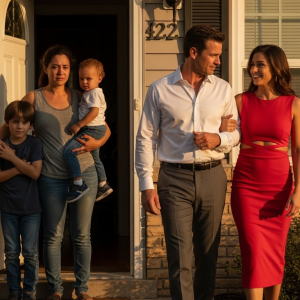My name is Taran. When I was nine, my parents told me I was a curse. Then, they left me on a doorstep with nothing but a backpack and the echo of a slammed car door. They never looked back. Not for birthdays, not for graduation, not even when I built a life from the wreckage they left behind.
Twenty-one years later, they resurfaced. Not for reconciliation. They came for money.
But the truth is, the betrayal didn’t start on that cold concrete step. It started long before, in the quiet dismissals and the constant rewriting of our reality. Why did they come back? Why now? And what do you do when the family that cast you out wants a piece of the success they never believed you could achieve? Let me tell you what happened.
I don’t remember the exact date—sometime in the late fall of 2004—but I remember the cold. It wasn’t the kind you could fight with gloves or a hoodie. This cold was an intruder; it crept under my skin and settled into the parts of me I didn’t yet know could break.
I was on the living room floor, legs crossed, coloring quietly while my parents argued in the kitchen. I had learned to become invisible when the shouting started. But that morning, their voices were different. Sharper. Each word felt less like an outburst and more like a verdict.
Then, I heard my name.
“She’s a curse, Arless!” my mother snapped, her voice like shattering glass. “Ever since she was born, everything’s gone to hell.”
“She was never supposed to be here,” he shot back, his words a low growl. “We were fine! I lost my job two months after she came. Then we lost the baby. It’s like she brought it all down on us.”
I froze, my crayon hovering over the page. I wasn’t supposed to hear that, but I don’t think they cared if I did. The walls in that house were thin, especially when it came to words like curse, bad luck, or mistake. I was only nine, but a warning bell chimed deep in my chest.
That afternoon, my mother called me into the hallway. Her face was a blank mask. No tears, no anger. Just emptiness. “Go pack a bag.”
My mind raced. A visit? A sleepover? “For how long?” I asked, my voice small.
She didn’t answer.
I packed my favorite jeans, a hoodie that was too big, and a small stuffed rabbit named Penny. I tucked Penny deep into the corner of my backpack, a secret shame. The drive was silent. I watched autumn leaves whip past the window, counting the seconds between turns, trying to solve the puzzle of our destination. When she pulled up in front of my grandparents’ house, my stomach plummeted.
She didn’t park. The engine kept running, a low, impatient hum. “Get out,” she said, her eyes fixed on the road ahead.
I stared at her, waiting for the punchline, for her to laugh and tell me to hop back in. The joke never came. I grabbed my bag, and the car door closed behind me with the finality of a gavel strike.
I stood on the familiar front step and rang the bell. My grandfather cracked the door open, his eyes squinting against the daylight. His voice was weary. “Taran? What are you doing here?”
I tried to speak, but the words were trapped in my throat. My mother’s car was already turning the corner at the end of the street. He sighed, a sound heavy with resignation, and stepped outside. “We can’t go against your parents, honey.” He left the door open just long enough to hand me a thin blanket, then he closed it. Gently, but firmly.
I didn’t cry. I didn’t scream. I just stood there, the blanket wrapped around my shoulders, watching the wind chase stray leaves down the empty sidewalk. I waited for someone to come back. No one did.
Hours crawled by. The sun dipped below the rooftops, and the air grew teeth. That’s when a soft, familiar voice cut through the growing dark. “Taran?”
It was Mrs. Lenora, the neighbor from across the street. She rushed over, her face a canvas of concern, and ushered me into her home without a single question. It smelled of cinnamon and old books. She made me tea I didn’t drink and called someone—I think it was Child Protective Services—but she told them not to come that night. “She’s been through enough for one day,” I heard her whisper into the phone.
She gave me one of her late husband’s sweaters, the sleeves hanging past my fingertips. As I curled into the corner of her couch, she sat nearby, a silent guardian. That was the first warmth I had felt all day.
I finally fell asleep staring out her window at the house I used to call home. It was dark, indifferent. I watched for a light to flicker on, for a sign that someone had noticed what they’d done. But all I saw was stillness.
That night, something inside me unhooked. The part of me that believed I belonged somewhere simply let go. I was only nine, but I knew what abandonment sounded like. It was the click of a car door, the hum of an engine driving away, and the profound silence that follows when you realize no one is coming back for you.
By the time I turned ten, the silence had a weight. It followed me through Lenora’s house and clung to my shoulders in every classroom. I was still the girl who brought home A’s, the quiet student who won the spelling bee and the poetry contest. But when my name was called at assemblies, no one clapped from the audience. Everyone else had someone waiting in the wings. I had a chair left empty.
At first, teachers would scan the crowd, expecting a proud parent to raise a hand. After a few times, they stopped looking. The empty chair was no longer an accident; it was a statement. It was mine.
But I kept trying. I wish I could explain this part to people who only see the polished version of my life now. I didn’t stop loving them just because they stopped loving me. For years, I wrote letters. Every holiday, every birthday, I’d scribble a note and slide it into an envelope.
Hi Mom, I hope you’re okay. I’m doing well in school. I miss you.
I’d place them in the small blue box near Lenora’s door for the outgoing mail. A part of me believed the act of writing was enough—that somehow, they would feel the message across the distance.
One afternoon, Lenora found me after I’d slipped another card into the box. She held a stack of returned envelopes in her hand. “Sweetheart,” she said softly, her voice gentle but honest. “These all came back. Marked ‘Return to Sender.'”
She handed them to me. My own childish cursive stared back at me. Some envelopes were worn, the ink smeared by rain. One still had a tiny glitter sticker in the corner.
“They don’t live there anymore,” she added quietly. “Haven’t for a while.”
That was when I stopped writing. Not with anger, but with a final, quiet understanding. Lenora never told me, “They’re not worth it.” Instead, she gave me a sentence that became a cornerstone of my new reality: “Some people break what they can’t control.”
I began to let go in the small, invisible ways only a child can. I stopped raising my hand in class. I avoided ‘student of the month’ assemblies. When I won the regional spelling bee at eleven, the photographer asked, “Can we get a shot with your parents?”
I just shook my head. “They couldn’t make it.” He snapped the picture anyway: just me, alone, with a smile I had practiced in the mirror.
There was one more card I wrote. After a major academic award arrived in the mail, I sat down and wrote on a piece of cardstock: I got another one. You still didn’t come. But I stopped expecting you to.
I sealed it, addressed it, and walked it to the mailbox on the corner. But instead of dropping it in, I stood under the streetlight, tore the card in half, and then in half again. I let the pieces fall into the trash bin by the curb.
“I get it now,” I whispered to the empty street.
It wasn’t a lightning strike of epiphany. It was something heavy inside me finally starting to lift, making room for air again. They may have erased me from their story, but I was about to write a new one of my own.
It started on an ordinary summer afternoon. Lenora was clearing out a tall wooden cabinet, a graveyard of old bills, recipes, and coupons. In between yellowed newspaper clippings, I found a thick manila envelope with my name handwritten across the front. Not To Taran, not With Love. Just my name, like a label on a specimen jar.
Inside were three folded bank statements and a short note in my late grandmother’s looping cursive. This is yours. I set it aside when you were born. You deserved something of your own.
My heart stuttered. The first statement, dated the year I was born, showed a savings account opened with $500. Over the years, it had grown to just over $12,000. To a fifteen-year-old girl with nothing, it was a fortune. I flipped to the last page.
Balance: $0.00
Withdrawal Date: Two weeks after they left me.
Lenora saw my face drain of color. We found the two withdrawal slips together. The signatures were my parents’. They hadn’t just thrown me out; they had quietly, legally, and completely cleaned me out.
“Even the money meant to protect me wasn’t safe,” I said, the words barely a whisper.
Later that evening, I pulled out a small box of childhood keepsakes. Near the bottom was a crumpled, taped-together sheet of construction paper. I remembered it instantly: a crayon drawing of a house, a sun, and stick figures holding hands—me, Mom, and Dad. I’d shown it to her the morning before she told me to pack my bag. She’d glanced at it, muttered, “That’s not our reality,” and ripped it down the middle. I had forgotten that part. Lenora must have found the pieces and saved them.
The old pain wasn’t sharp anymore. It was just deep, familiar. That night, I didn’t feel grief. I felt rage. Not the kind that burns everything down, but the kind that builds something better just to prove it can be done.
The next morning, I sketched the drawing again. Same house, same stick-figure me. But this time, there were only two figures: me and Lenora. Underneath, I wrote in capital letters: START HERE.
That afternoon, I walked three blocks to a local café and asked for a job application. The woman behind the counter sized me up. “You’re a little young, but you look like you mean business.”
I nodded. “I do.”
After my high school graduation—a ceremony where my name was conveniently skipped during the honors roll call—I retreated. I took the pain and fury and channeled it into a project. In the small back room of Lenora’s apartment, surrounded by old paperbacks, I started building.
The idea was a digital resource board for kids like me—kids who didn’t have a family to cosign a lease or explain financial aid. Kids who had to learn how to exist on their own. I called it OpenVest.
I spent my days at the public library, teaching myself to code. I spent my nights scrubbing floors at a 24-hour gym and working the breakfast shift at a diner. My life was a cycle of lemon cleaner, bacon grease, and lines of code. I was building something no one could take away.
I launched the site quietly, sharing a link in a foster care forum. The first comment read: This is exactly what I needed two years ago. And that was all it took.
One day, a tech blogger featured me in a “Young Innovators” segment. The article went viral. Suddenly, my face was on national digital magazines with headlines like: The Founder Who Built Herself from Nothing.
I waited, my phone face up on the counter. No texts from my parents. No emails from relatives. Just silence. Over tea, Lenora said gently, “You weren’t made to be clapped for by them.”
I smiled, a real smile this time. “That’s okay,” I replied. “I’m not building for applause. I’m building something that outlives it.”
A few weeks later, Lenora took a bad fall, and we ended up in the ER. As I waited for her x-rays, I heard a voice that made my blood run cold. Across the hallway, my mother was comforting a young woman, her hand on the woman’s shoulder, her expression tender in a way I had never received.
Her eyes met mine. For less than a second, there was a flicker of recognition, and then… nothing. She looked away, turning back to the woman as if I were a stranger, a ghost in the beige hallway. Ten minutes later, she walked right past me. No nod, no glance, no acknowledgement that I was her daughter, that I even existed.
The child inside me, the one who still hoped for a sign, finally went silent.
Three days later, I got a text. Hey. I saw you at the hospital. Didn’t know what to say. I’m sorry. Glad you’re okay. It was my sister, Elizabeth. We hadn’t spoken in over a decade.
I read it twelve times before replying. Thanks. Me too.
That was it. I didn’t ask how she was. I didn’t suggest we meet. It wasn’t revenge; it was a boundary. I had spent years thinking closure was an apology spoken out loud. I finally understood that sometimes, closure is the silence you create for yourself. It’s not answering the text. It’s not needing their recognition to prove you exist.
Just when I thought they were a permanent part of my past, a letter arrived. Cream-colored, stiff, and addressed in my mother’s cursive. It was from a law firm. Inside, a formal, polished request: my parents, through legal counsel, were asking me to help pay for my younger brother’s college tuition.
They cited, in their words, “the years they raised and supported me” as justification.
It wasn’t the money. It was the audacity. The complete, breathtaking rewrite of history. As if those years hadn’t ended with a backpack and a locked door.
My hands trembled before I folded the letter and placed it on my desk. The next day, an email arrived from my “Uncle Gordon.” Subject: Family Duty.
Taran, we all do things we don’t want to for the sake of family. Blood matters. You were given a chance. It’s your turn to give back.
The venom was in the assumption—that I still belonged to them, that my success was a resource they were entitled to tap.
I printed the letter and the email. On a sticky note, I wrote: My silence is not an agreement. It’s an upgrade. I filed them away and called my lawyer.
What they didn’t know was that two weeks earlier, a mysterious box had arrived at my door. Inside was a dusty VHS tape. I digitized it. The footage was grainy, time-stamped April 3rd, 2004. It showed a nine-year-old me on a porch, clutching a backpack. You could hear my father’s voice, clear as day: “You don’t live here anymore.” Then, the sound of a car door slamming and tires crunching on gravel.
A neighbor had filmed it. And now, I had it.
I gave the footage to a journalist friend. We recorded my statement in one take—no dramatic lighting, just me in my office, looking into the camera.
“This isn’t revenge,” I said calmly. “This is record-keeping. For every child who was told they were the problem, for every kid who wasn’t believed.”
We posted the clip. Within 24 hours, it had over three million views. The comments weren’t pity; they were solidarity. Then came the email from their lawyer: We are open to resolving this matter privately, in the interest of preserving family dignity.
I didn’t respond. I didn’t have to. The world had seen the truth.
The final act came not in a courtroom, but in a parking lot. It was a Friday afternoon. As I walked out of my office, I saw her. My mother, Darlene, standing near my car, her purse clutched in her hands. My father stood a few paces behind her.
“We didn’t come here to argue,” she began, her voice cracking. “You’ll always be my daughter, no matter what.”
She stepped forward, her arms beginning to lift for a hug.
I raised a hand, gently, and took a single step back. She froze. The air between us was thick with unspoken history.
“You think this success means you don’t need a family?” she asked, her tone shifting from sorrow to accusation.
I finally found my voice. “This success means I finally understand what family actually is,” I said, my voice even and clear. “And what it isn’t.”
I looked past her, at the building I had built, at the life I had made. “Thank you for coming by. You’re free to go now.”
I turned and walked away, my heels steady on the concrete. I didn’t look back. Closure hadn’t come when they apologized. It came when I realized I didn’t need them to.




